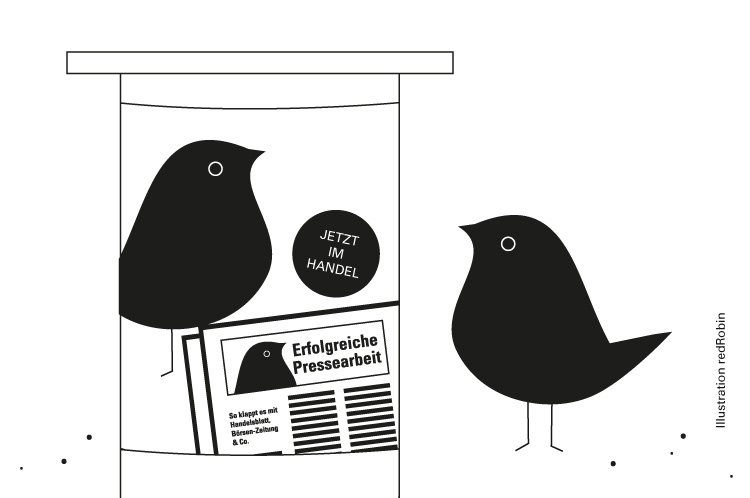Investors are increasingly informing themselves about investment opportunities and events on the financial markets. They read newspapers and specialist media, listen to podcasts, and use Google to research specific financial products. For fund houses and asset managers, this pro-activity offers a communications opportunity: through targeted public relations (PR), they can generate awareness among potential customers and influence how their company and products are perceived by the public. After all, which company is an investor more likely to entrust with his money? Company A, which merely has a website and some fancy flyers - or Company B, whose financial professionals also comment on market events in Handelsblatt and highlight current investment trends in bylined articles?
The communication channels available to companies are diverse. These include the classic, independent print and online media, the company's own channels such as blogs and social media profiles, as well as more modern formats such as podcasts or Clubhouse. Which channels are used to what extent depends on the time, personnel and financial resources that a company wishes to invest in its communications.
One of the most important tools, however, is still classic presswork, the aim of which is editorial reporting. Its decisive advantage: credibility. According to a 2019 study by WDR (Westdeutscher Rundfunk), 90 percent of Germans rate the quality of information provided by newspapers, magazines, radio, and television as very good or good. Trust in social media, on the other hand, varies between only 6 and 11 percent, depending on the channel.
However, generating positive media attention is easier said than done. Sending out press releases alone will not get a company far, because journalists receive hundreds of e-mails every day. In order to get heard in the noisy media world, companies should therefore consider the following five points when working with the media:
1. Define your target groups
A clear definition of target groups is the basis for all strategic and operational media work. The respective target groups determine which media are addressed with which topics and how the content is presented. For example, institutional investors tend to read Institutional Money or Portfolio Institutionell, while private investors prefer Euro am Sonntag or Focus Money. Professional investors can also be assumed to be familiar with technical terms such as alpha or merger arbitrage. If, on the other hand, a press release or guest article is aimed at private investors, such terms should be explained briefly.
2. Find topics apart from corporate news
Corporate news around fund launches, closings or new hires are important for press relations to ensure a kind of "basic noise" in the media. However, companies that want to make a name for themselves among their target groups, build trust and be perceived as experts need to be more active in their communications and cover topics that go beyond these obvious occasions. Many companies that are still in the early stages of their PR work are not even aware of how much exciting content results from their investment focus. Mediolanum International Funds' GAMAX Funds Junior, for example, invests in companies with strong brands that are popular with younger generations. This results in a real treasure trove of ideas. A small selection of topics that have been particularly popular with journalists in the past: the new consumer patriotism of young Asians, investment opportunities in the gaming and e-sports segment, the influence of millennials on the Chinese insurance market, and the challenges and opportunities arising for sporting goods manufacturers from the Covid-19 crisis.
3. Position your experts
Financial and economic issues are becoming increasingly complex. For companies, however, our fast-paced world offers communicative opportunities, because journalists are working under ever-increasing time pressure. That's why they often turn to external experts as interview partners, who bring the necessary expertise to the table. Regardless of whether they are fixed-income professionals, stock pickers or analysts - asset managers should use their financial professionals for communications and share their know-how on market developments, asset classes, sectors, and investment strategies with the media. The goal: to stand out from the daily flood of information with exclusive content and position themselves as informed experts - because really good PR is always journalistic.
4. Treat journalists as you would treat important business partners
Good relationships with journalists from the trade and business press are key to successful press relations. It doesn't really take much to cultivate these relationships: prompt responses to requests for interviews or quotes, adherence to deadlines and agreements, and thorough preparation before interviews. And most importantly, journalists should be seen as business partners at eye level. They are not remote employees of the PR department. In practice, this means, for example, that factual errors in quotes submitted by the journalist for approval can of course be corrected. However, it is a no-go to rewrite the entire interview because the answers may not conform to the official company wording.
5. Think about communication holistically
Exciting interviews and engaging articles are only one side of the PR coin. PR becomes even more effective when press content is supplemented with meaningful graphic material. This could be performance charts, infographics or videos, for example. Because with visual content, one glance is usually enough to grasp the broad theme. In order to grasp the meaning of texts, on the other hand, they must first be understood in their entirety.
All this shows: Good PR doesn't happen by the way. On the contrary. Companies that are serious about their media work should therefore either hire a public relations manager or seek support from external professionals. The effort is worth it, because effective communication generates attention, creates trust among the target groups and strengthens the reputation.
(Published as a bylined article in performer Magazine No. 29 of Patriarch Multi-Manager GmbH. Read more here.)


